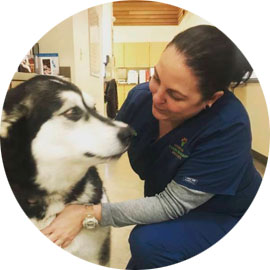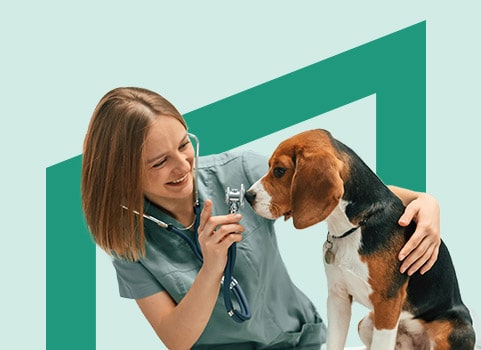How much do veterinary technicians make?
The average vet tech salary is about $43,740 per year*, though that can vary based on your experience, credentials, where you work, and other factors.
What can I do with a Veterinary Technician Associate Degree?
Credentialed veterinary technicians can find positions in various environments such as small and large animal veterinary practices, zoos and wildlife facilities, humane societies or animal control centers, and even research facilities. Veterinary technicians may also be eligible for a pay raise after completing a program like a Veterinary Technician Associate Degree.
How much does a Veterinary Technician Associate Degree cost?
Tuition costs up to $144 per credit, with the semester fee adjusting slightly based on our current offer. Visit our tuition page for the most current tuition information.
Is the veterinary technician degree accredited?
Penn Foster's Vet Tech Associate Degree Program has full accreditation with the American Veterinary Medical Association (AVMA) through their Committee on Veterinary Technician Education and Activities (CVTEA). Additionally, Penn Foster College is nationally accredited by the Distance Education Accrediting Commission (DEAC).
What are the vet tech externship requirements?
The first practicum is completed at the end of semester two, after all academic work has been completed. Clinical Externship 1 is 150 hours over a 10 week period (though an extension can be applied on a case-by-case basis) and covers 29 skills. This first practicum focuses on cats and dogs.
Clinical Externship 2 takes place after your final semester’s academic work is complete. This externship is 200 hours long, over 18 weeks, and covers 51 skills. The last practicum covers small animals, large animals, and lab animals.
Before beginning your externship, you’ll be required to submit the site you’d like to use for approval. If a site you want to do an externship at doesn’t meet all of the skills requirements, you are able to do your skills at different approved clinics.
Does Penn Foster place students in an externship site?
Penn Foster does not place students in externships. Students are free to choose any externship site near them that meets the requirements. If you’re already employed at a clinic or site that meets the requirements, you are able to complete your practicum there as long as your employer is willing to allow you to do so.
Penn Foster has partnerships with clinics like VCA, Banfield, Blue Pearl, and more, at which students may have success in finding a placement. However, these partnerships do not guarantee placement and it is up to the discretion of the clinic whether or not they take on students.
What degree is best for a vet tech?
Generally, the best degree for a vet tech to start out with is an associate degree. While there are veterinary technician bachelor’s degree programs, one prerequisite for these programs is that you’ve already completed your associate degree.
What is the pass rate for the VTNE?
The national pass rate for the VTNE is 70%. Penn Foster’s current pass rate is 72%.
How fast can you complete Penn Foster vet tech program?
Generally, the fastest you could potentially complete the Penn Foster Vet Tech Degree is 2 years.
What is the difference between vet tech and vet assistant?
The difference between a vet tech and a vet assistant often comes down to job duties and the level of education needed. Veterinary assistants aren’t required to go to school or to be certified; veterinary technicians often need to complete at least an associate degree and gain credentials. Additionally, vet assistants tend to focus more on the administrative aspects of the veterinary clinic, such as setting patient appointments, while vet techs are focused on the more clinical aspects, such as assisting the veterinarian with exams, surgeries, and lab work.
What's the difference between a vet technician and a technologist?
The difference between a veterinary technician and a veterinary technologist is the level of education they need to do the job. Vet technologists need to complete a bachelor’s degree and, once they’ve earned that, can often specialize in different aspects of veterinary medicine.











































